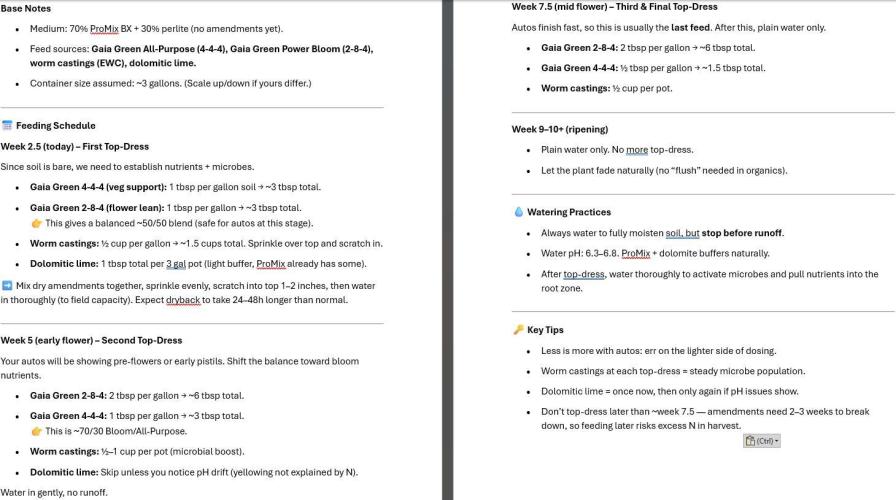The Grow Awards 2026 🏆 




















PH levels?
ursamajor1703started grow question 6y ago
I don't have a way to measure ph levels but I just used potting soil will it be ok or is super important?
likes
NobodysBudsanswered grow question 6y ago
pH problems can potentially cause any and all nutrient deficiencies and toxicities.. so, kinda imporant. Soil is more forgiving due to its microbial content.
If you have RO, you are probably fine without ever checking or a second thought about it. Although your fertilizer could be a problem if extremely acidic when added to RO as opposed to a ~8.0-8.4 alkaline tap water you typically see. Some ferts are actually expecting you to use that 8-8.4 instead of 7, which would potentially result in a very acidic irrigation.
It's just chemistry. At various pH levels the plant's bio-chemistry simply won't work. Just like if you start pounding water you will die from hyperhydrolosis. your body's chemistry will simply fail to work - due to concentrations rather than pH but same fundamental concept. a plant's processes require a range of temps, pH, pressure, etc... all are important, but usually you don't have to worry about many at one time.
pH strips are cheap and can resolve down to .1 pH, which is more than good enough. Get 100 for $7 on amazon. Test your water.. if city water it'll be consistent. If well water, you probably want to test occasionally and especially after heavy rains. Know what your ferts do to pH too... after a while, you won't have to test at all. The familiarity you gain will be enough. measure and be consistent. it'll always balance out the same because it's math/physics/chemistry = reality.
labifleanswered grow question 6y ago
Salut le jardinier ! c'est toujours sympas de savoir son ph comme ça ca t'évite d'avoir des problèmes de ph justement après t'a juste besoin des gouttes ou alors des bandelettes pour tester le ph c'est assez simple a trouver. tu peut aussi trouver des astuces par exemple j'ai de la terra au ph 7.5 avec un engrais pour tomate au ph 3.5 et je mélange 50 grammes d'engrais a 7.5 litres de terre et j'arrose avec une eau du robinet autour de ph 6.8 donc a mon avis je resterais toujours autour de 7. bonne chance a toi bella ciao
1 like
Complain
MadeInGermanyanswered grow question 6y ago
With organic grow it is not so important, with normal earth coco hydro aero you should measure 💪🏻
likes
Complain
Similar Grow Questions
Solved

Blind_japanese
Cant get Ph downHelp, i cant get ph down. My soil PH is very high, above 7.7. I tried to water It with phed water, ph 5, many times but the ph didnt change. Now i am flushing It and after 130 liters of phed water, the ph is the same. This plant os gonna die If I don't do something. Any ideas?Week 5
Setup. Substrates
6y ago
1
1
Solved

Tremojem
FFOF or Cana Coco Coir BricksI have a couple bags of FFOF in my grow room supply cabinet and three bags of perlite, fine, medium and course.
I am thinking that after I use up the FFOF, that I will switch to Cana Coco Coir Bricks.
Okay bring it on...I am ready for your suggestions and comments. Let's go!Week 7
Setup. Substrates
3y ago
1
2
Solved

Scott13
good evening guys I want some information about flushing and ripen thanksOther. General questions
Setup. Substrates
5y ago
1
Solved

SheZz0
PH rise in DWCI'm having serious problems with the water PH. My tap water it's around 8PH and 300ppm, I'm using GHE PH down as other times until 5,5ph. I don't know why, this time few hours later the acidity of the water rise between 1 or 2 point, Any idea what happen?
Setup. Substrates
Setup. Other
5y ago
3
4
Solved

VertiGrow
Is it better to adjust nutrition if using soil from a previous grow?One of my grows is nearing the end and is being flushed this week ready for the chop on Saturday. Do I need to adjust the feed schedule for the next grow to account for any residual nutrients in the soil from the last grow? I am using BioBizz Light-Mix soil & full BioBizz range.
3y ago
10
7
Solved

Agricola_Borealis
Worms in pot.Worms in pots. About a week after germination I have introduced about a dozen earthworms in the 10 liter bucket where my plant is growing. I read a lot about worm poo, but never I seen someone introducing worms in the pots where their plants grow. Anyone any experience? Why not?
Week 2
Setup. Substrates
4y ago
5
4
Solved

LostInTransit23
Can I grow with biobizz all mix using shogun coco nutes?Can I use Shogun coc a+b and calmag with biobizz all mix?Setup. Substrates
Feeding. Chemical composition
6y ago
2
Solved

m0use
PhUp P.Hydro vs. P.Carb vs. BothPotassium Hydroxide Vs. Potassium Carbonate : or Both for PH+ up.
Does one have lower EC value in solution when used?
Does ones have better stability in solution for hydro or soil?
Does one have more reactivity with other elements in the grow?
Does one have higher PH?
Cheers,3y ago
4
1
Solved

ganzigunnu
Adjusting Soil pHBiobizz Lightmix is the only soil I could see 6.5 that's why I use it but this time I measure it's 7 my question how come does it happen even though the water it's been getting was no more than 5.8 all the time?
I know my organic ph thing adjusts it only for couple of hours.
4y ago
1
3
Solved

Woodside
Advice on growing in a 5x5 tentAfter 3 attempts growing I’ve decided to invest the money in some decent equipment for a 5x5 tent,I currently have a ts3000I’m looking for help with how to ventilate the area correctly. The last 3 times I ended up with mold but used a light and tent. Advice for a set up please !Setup. Substrates
Setup. Ventilation
3y ago
2
6
Solved

Dankbudz1
GHas any one used blue skies vienna seed and are they as good as he claimsSetup. Substrates
4y ago
1
1
Solved

XanHalen
Switching to Gaia Green Organics, How is my Feed Schedule Looking?SEE PHOTO FOR FULL SCHEDULE, COMMENT TWEAKS OR ISSUES PLEASE!!!
Setup. Strain - Autoflowering
Setup. Substrates
Feeding. Schedule
5mo ago
1
3
Solved

Soxlvr22
Soil settled in the potI have auto flowers for a first grow. After about 4-5 weeks, The dirt has settled a few inches below the top of the 3 gallon pots (obviously didn’t pack it well enough). Should I just leave it as it is, transplant, or?Plant. Other
Setup. Strain - Autoflowering
Setup. Substrates
5y ago
3
3
Solved

Tubington9
Anyone who uses fox farms happy frog? Transplanting 3 week seedlingsTransplanting in to fox farms happy frog. First time using this soil, anyone who has experience with it and tips for successful transplant would be much appreciated. Heard ocean forest is “pretty hot soil” and not to use nutes for a few weeks, seeing if this is similarSetup. Substrates
5y ago
2
2
Solved

Dillsnills
What is the best way to get rid of fungus gnats? First time I've ever had a prob with them, advice plzz and will be appreciatedI have some minor issues going on with fungus gnats, I'm trying to prevent more and get rid of them. What is the best way to get rid of the fungus gnats. Advice opinions input greatly appreciated.
Other. Bugs
Setup. Strains - Photoperiod
Setup. Substrates
4y ago
3
4










